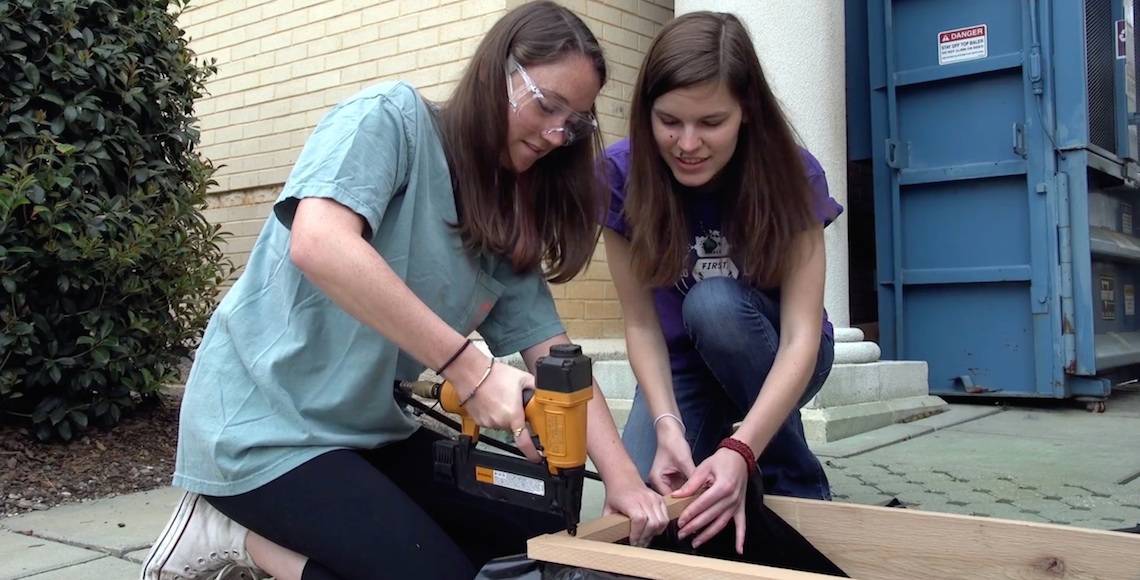Hallmarks of Service-Learning
The Honors College of South Carolina is located in the middle of Columbia, a thriving capital city where volunteer opportunities abound.
Service-learning is one of the most rewarding things Honors students have the opportunity to do, and there are a number of ways to use a service-learning experience to fulfill our Beyond the Classroom requirement. One of our goals is for each student to leave the Honors College with a desire to give back and to help in ways that highlight their talents.
“My service-learning provided a concrete example of concepts discussed in the course.
Discussing the presence of hunger in America in class was informative, but then going
out and seeing in my community during my service at a local soup kitchen was absolutely
eye opening.”
- anonymous quote taken from course evaluations
All SCHC service-learning courses incorporate:
- Integrated Learning: A clear link exists between the community service and the academic content.
- High Quality Service: Projects are meaningful, well organized and address a community-identified need.
- Collaboration: Students, faculty and community partners all play an integral role in the planning and implementation of the project.
- Civic Responsibility: Projects promote student responsibility for community well-being.
- Reflection: Structured time or assignments allow students to analyze the experience and course connections.
- Evaluation & Assessment: Students, faculty and community partners participate in evaluating the project or courses.
Student Service Organizations
You'll be able to choose from a wide variety of service-learning opportunities or develop your own. Some students choose to help members of the Columbia community in specific, hands-on ways, while others prefer to raise funds for non-profits or do research that will benefit people and communities in need.
Many students gravitate toward service work that complements their program of study. Here are a few projects available to current students.
Waverly After School Program was started in 2003 by a motivated group of Honors College students who learned of
a local need for after school tutors during a Martin Luther King Day of Service. Since
then, Waverly has become an Honors student organization and has been awarded a lifetime
grant of $10,000 by State Farm Insurance. Their mission is to enhance the lives and
opportunities of children in the Columbia community, to serve as educational role
models who provide a fun, safe and caring experience and to develop the self-esteem
and literacy skills of all children who participate. Waverly members believe that
all children need a safe place to go after school each day with caring, responsible
adults and programs that encourage both learning and personal growth. Waverly After
School Programs has four core functions: 1) To provide educational enrichment 2) To
promote continued educational excellence 3) To provide youth with positive role models,
and 4) To develop student volunteers into leaders.
Email the Waverly After School Program
Project VIDA is an Honors student organization at the University of South Carolina that welcomes
students from a variety of backgrounds. Members of Project VIDA create presentations
about healthy living for elementary, middle and high school populations in underprivileged
communities. It started through an Honors College initiative (Drop Everything And
Lead) and has been supported by the Bernard and Arline Ramsdale Endowment Fund. Since
its creation in fall 2010, Project Vida has been committed to educating youth in the
Columbia community about healthy living. Volunteers in Project Vida have learned to
seamlessly translate their academic passions into interactive and fun presentations
for the young people they work with. This organization has given students the opportunity
to use their classroom experiences to impact the lives of community members, while
receiving personal, professional and civic growth. One Project Vida member stated,
"Even though we are the ones providing the information on health, I never fail to
learn new things with each presentation."
Email Project VIDA
